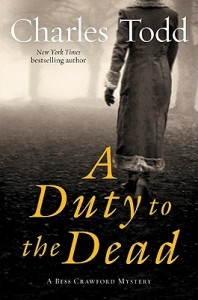 A Cruel Deception (Bess Crawford, #11) by Charles Todd
A Cruel Deception (Bess Crawford, #11) by Charles Todd Format: eARC
Source: supplied by publisher via Edelweiss
Formats available: hardcover, paperback, large print, ebook, audiobook
Genres: historical fiction, historical mystery, World War I
Series: Bess Crawford #11
Pages: 305
Published by William Morrow on October 22, 2019
Purchasing Info: Author's Website, Publisher's Website, Amazon, Barnes & Noble, Kobo, Bookshop.org
Goodreads
In the aftermath of World War I, nurse Bess Crawford attempts to save a troubled former soldier from a mysterious killer.
The Armistice of November 1918 ended the fighting, but the Great War will not be over until a Peace Treaty is drawn up and signed by all parties. Representatives from the Allies are gathering in Paris, and already ominous signs of disagreement have appeared.
Sister Bess Crawford, who has been working with the severely wounded in England in the war’s wake, is asked to carry out a personal mission in Paris for a Matron at the London headquarters of The Queen Alexandra’s.
Bess is facing decisions about her own future, even as she searches for the man she is charged with helping. When she does locate Lt. Lawrence Minton, she finds a bitter and disturbed officer who has walked away from his duties at the Peace Conference and is well on his way toward an addiction to opiates. When she confronts him with the dangers of using laudanum, he tells her that he doesn’t care if he lives or dies, as long as he can find oblivion. But what has changed him? What is it that haunts him? He can’t confide in Bess—because the truth is so deeply buried in his mind that he can only relive it in nightmares. The officers who had shared a house with him in Paris profess to know nothing—still, Bess is reluctant to trust them even when they offer her their help. But where to begin on her own?
What is driving this man to a despair so profound it can only end with death? The war? Something that happened in Paris? To prevent a tragedy, she must get at the truth as quickly as possible—which means putting herself between Lieutenant Minton and whatever is destroying him. Or is it whoever?
My Review:
This is a story about being stuck in limbo, and that’s fitting for its time and place. Because in Paris, in the spring of 1919, there was nothing but limbo. Not for the residents of Paris, not for the delegates to the Peace Conference, and certainly not for Bess Crawford, one of the many nurses in Queen Alexandra’s Imperial Military Nursing Service who was wondering whether she would be able to stay in the service once the wounded from the (hopefully) late war were finally settled and cared for back home in England.
And whether, or what, that was what she truly wanted.
 When we first met Bess, back in November 1916 in A Duty to the Dead, she was a dedicated battlefield nurse in a war that was already two years old and seemed to have no end in sight. Getting through each day and each night, saving who she could and grieving the many she could not was all that the eye could see.
When we first met Bess, back in November 1916 in A Duty to the Dead, she was a dedicated battlefield nurse in a war that was already two years old and seemed to have no end in sight. Getting through each day and each night, saving who she could and grieving the many she could not was all that the eye could see.
But in March of 1919, when this story takes place, the Armistice has been in effect for over 5 months, but a peace treaty was nowhere in sight. The Allied Powers are in a state of such disagreement that it sometimes seems as if a shooting war will break out across their negotiating table long before they reach the point where they can present anything like a united front to the Central Powers, meaning Germany and her allies.
It’s into the middle of this muddle, slightly muddled herself, that Bess finds herself back in Paris, and just like her “adventure” in The Shattered Tree, poking her nose into places that entirely too many people think it doesn’t belong.
Especially the man that she has come to Paris to find, Lieutenant Lawrence Minton. Lt. Minton’s mother is someone whose requests Bess is unable to refuse. His mother is the current Matron, or head, of the nursing service that Bess would like to remain part of after the war is finally officially over.
Matron is concerned that her son has been reported absent from his duties as one of many military attaches to the peace conference, and when Bess arrives to investigate, she learns that those fears are more than justified. The lieutenant is not just missing, he seems to be rusticating in the French countryside and doing his level best to remain doped to the eyeballs on laudanum every waking minute.
Bess feels caught between a rock and a hard place. If she reports the man’s current state to anyone, including his mother, officialdom will step in and he will be discharged in disgrace. As the lieutenant is an officer in her father’s old regiment, that disgrace will reflect badly on the regiment and could even reach up to the Colonel Sahib, who may no longer be the regiment’s official leader but is still involved with both the regiment and the war effort.
So Bess decides to investigate the matter herself – as she so often does. She knows that something happened to Minton in Paris that seems to have changed him overnight from a dutiful, conscientious officer who wanted to remain in uniform to a lying, cruel opium addict. She is determined to find out just what is driving the man’s search for oblivion at any cost.
That her search sends her straight into the path of someone determined to drive Minton to that oblivion, and to death beyond it, by the quickest road puts Bess in the sights of a murderer with nothing left to lose.
A place that Bess seems to find herself again and again, but this time without her usual allies and with more than the usual number of enemies.
 Escape Rating B: As I said at the top, this is a story about being in limbo. There are just too many things that are very much up in the air, and Bess’ investigation into Minton’s circumstances are just one of the many, many things that are hanging.
Escape Rating B: As I said at the top, this is a story about being in limbo. There are just too many things that are very much up in the air, and Bess’ investigation into Minton’s circumstances are just one of the many, many things that are hanging.
The problem for the book is that limbo is a frustrating place to be, but not generally an interesting one. Limbo is angsty without a resolution in sight. While Bess’ investigation does eventually lead to resolution and the hope of closure for Minton, most of the other circumstances are out of her control, even at the story’s end.
And it seems as if Minton’s situation is equally unresolved for about 2/3rds of the story. Bess spends a LOT of time trying to figure out what’s wrong with him and then searching for answers that seem to be out of reach, either lost in Minton’s confused mind or eluding her through the streets of war-weary Paris.
As is known from history, the formal state of war between the Allies and the Central Powers did not end until the signing of the Treaty of Versailles on June 28, 1919. A treaty which, again as we know now, led directly to the conditions which brought about World War II. But at the point where this story takes place, the Allies are still wrangling. France wants Germany to pay crippling reparations, a condition which they eventually won. The U.S., under President Woodrow Wilson, has his optimistic vision for the League of Nations, which he also eventually won. Neither side got exactly what they hoped for, but hindsight is always 20/20.
However, as this story takes place, the treaty is in the future. What is known is that all the powers, with the possible exception of the U.S., are much too war-torn and war-weary for the hostilities to continue, no matter what it takes to get everyone to the treaty-table.
Bess herself is in limbo, as the nursing service is drawing down rapidly. Many women are resigning in order to marry the men they either waited for or met during the war. Those that survived. England lost a generation of young men in the war, and many women would be unable to marry after the war because there weren’t nearly enough men left TO marry.
Bess can return to her parents house and be their daughter again. Not that she was ever disowned – far from it. She has, however, the option to be the daughter that she would have been if the war hadn’t intervened. But it did. She’s used to being on her own, making not just her own decisions but decisions of life and death for the men under her care. Going back to being anyone’s protected, obedient and dependent child is not a path she wants to take.
At the same time, in spite of the number of proposals that she has received during the war, she has no desire to see if any of those proposals were real. She may have liked or been fond of the men who made them, but she doesn’t love any of them. She’s not sure if there’s anyone she does love enough to marry. Except possibly her father’s regimental sergeant, Simon Brandon, a man who has been part of her life and her family for many years. But Brandon is absent throughout this story, as far as Bess knows off in Scotland courting someone else. Maybe or maybe not.
So Bess is in a personal limbo for this whole story. Admittedly, she doesn’t angst about it a lot, and when she does, it is mostly about her career and future in general, and not about marriage in particular, to Simon or anyone else. Not that Simon has ever offered. But it never read, at least to me, like romantic pining or that the story was in any way revolving around her love life. Bess is trying to figure out what her future will look like at a time when all futures were very much up in the air. As an intelligent, thoughtful person, worrying about the future in these circumstances is the right thing for her to be doing.
But limbo is just not as interesting as action. Or at least forward motion in some form. Something that I hope to see a lot more of whenever Bess returns in her next adventure.






















